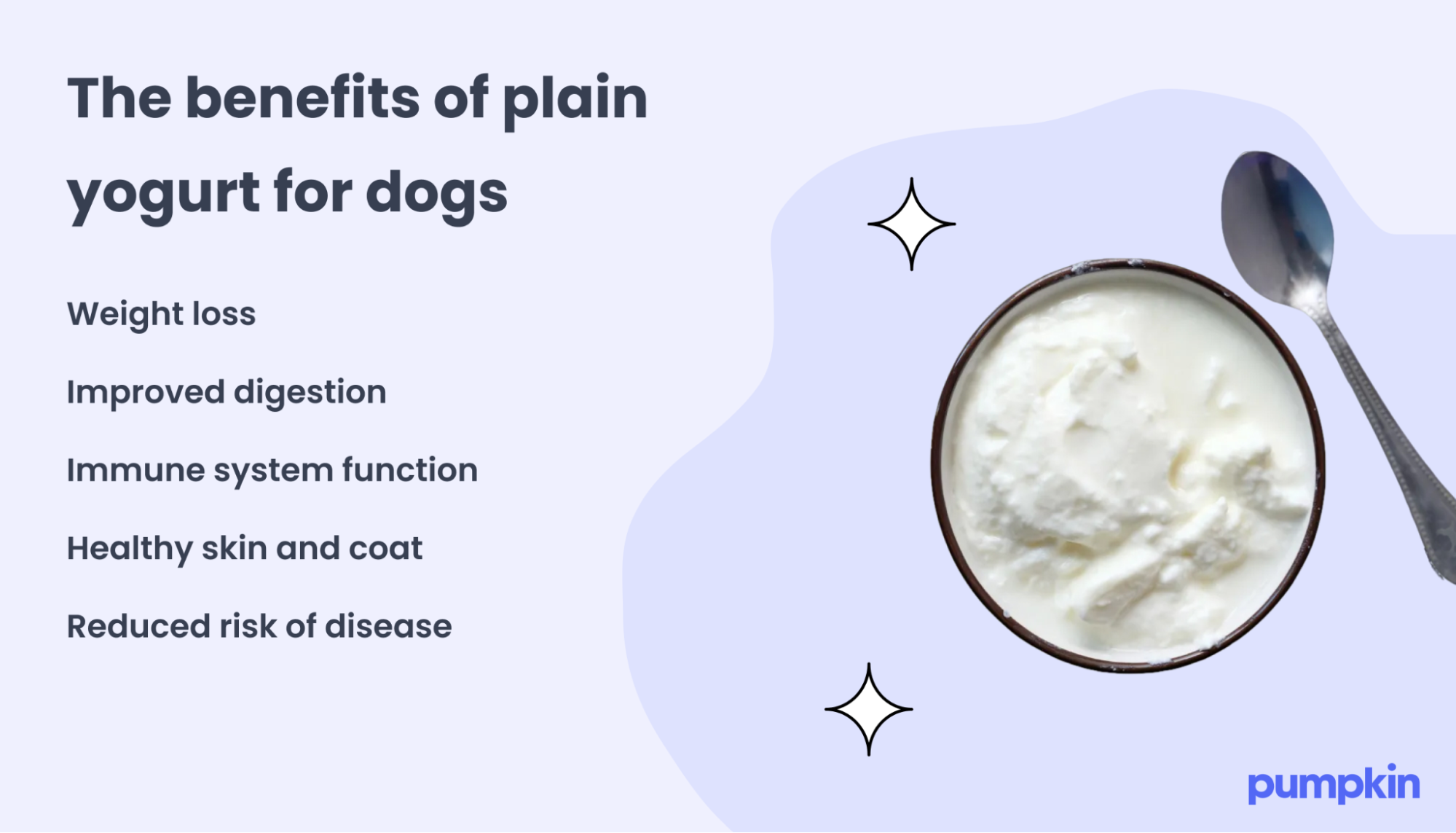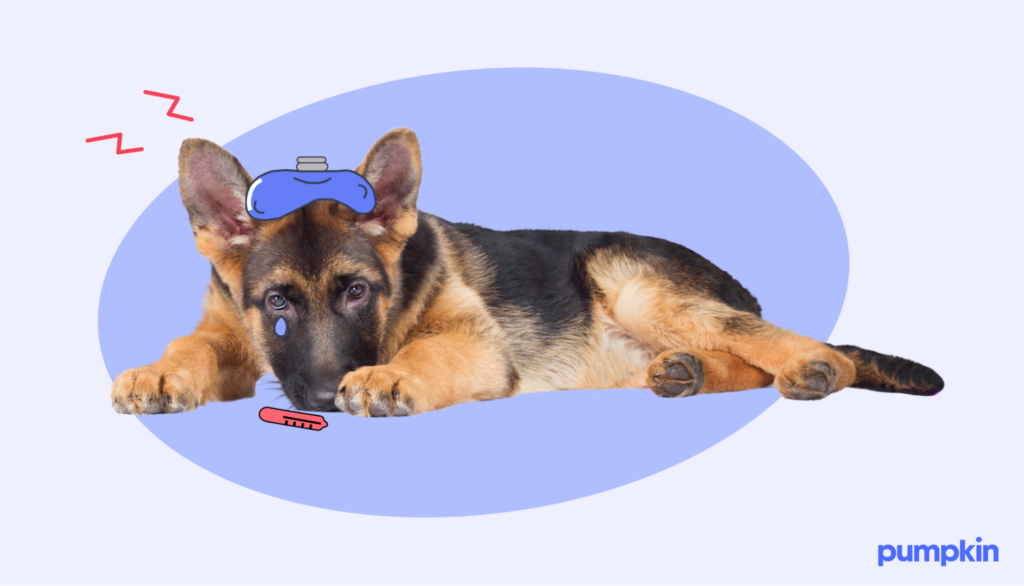Key Points:
- Dogs can eat plain, unsweetened yogurt in moderation, but some dogs don’t like the taste or texture.
- Avoid yogurt with added sugars, artificial sweeteners, or toxic fruits for dogs.
- Try mixing yogurt with dog-safe fruits and veggies to create healthy smoothies, pupsicles, and other dog treats.
Do you feel guilty eating yogurt in front of your pup? Or, do you wait until they’re not looking before you indulge in this healthy snack?
If those big begging eyes are too much, it may seem easier to sacrifice this probiotic-filled food than say no to your dog.
But what if we told you that most dogs can eat yogurt when served in moderation? As long as it’s free from added sugar, artificial sweeteners, and additives, yogurt is on the “occasional treat” list.
Health benefits of yogurt for dogs
Yogurt contains nutritional components that provide a range of benefits for dogs.
Probiotics
Probiotics are live organisms (usually bacteria, but sometimes fungus as well) that support a healthy digestive system. The bacteria in our gastrointestinal tract are essential for breaking down food, and a healthy gut biome can even support a weak immune system.
If your dog suffers from ear infections, hot spots, or itchiness, the probiotics in yogurt may help relieve their symptoms. Probiotics fight the yeast that causes these conditions, reducing the symptoms and frequency of infection.

Calcium
Calcium builds strong bones and teeth and supports a strong heart and nervous system. Dogs don’t produce calcium naturally, so they need to get it from their diet. If they don’t get enough, your pup may end up with a calcium deficiency. Yogurt is one way to boost their intake of this vitamin.
Dietary protein
Protein is an essential nutrient for the growth and maintenance of almost all your dog’s bodily tissues. It supplies the amino acids necessary to build hair, skin, tendons, cartilage, and muscles.
Whey
The whey in yogurt contains casein peptides, which demineralize the plaque and tartar on your dog’s teeth. These peptides can neutralize bacteria and reduce tooth decay.
The risks of dogs eating yogurt
Even though yogurt has health benefits, it might not be safe for every dog. Consider these risks before sharing a lick of yogurt with your pooch:
Lactose Intolerance
Milk and yogurt contain lactose, and after they wean from their mother’s milk, dogs don’t produce the enzymes needed to digest these foods properly. Symptoms of lactose intolerance in dogs include:
- Lack of appetite
- Diarrhea
- Gas
- Bloating or abdominal discomfort
Symptoms of lactose intolerance can occur up to 48 hours after eating dairy.
Look for yogurt with live, active cultures on the ingredient list; these have less lactose than regular pasteurized varieties.

Milk allergies
Yogurt can be safe for dogs, but if they have an allergy to dairy products, it can lead to illness. If your dog has a milk allergy they may experience:
- Diarrhea
- Vomiting
- Nausea or lack of appetite
- Excessive itchiness around ears
- Excessive paw licking
- Skin redness
- Hives
- Swelling of the face
- Breathing difficulties
Your vet can tell the difference between lactose intolerance and an allergic reaction. Seek advice if you suspect your dog has a food allergy.
Pet Pro Tip: If you have a dog that is prone to ‘snacksidents’ – you should consider getting a dog insurance plan as soon as possible. It can help you afford the best care in the future by covering eligible vet bills for digestive illnesses, toxic ingestion, and more.
High sugar content
Many yogurts have added sugars for (human) palatability. However, your dog’s digestive system can’t process these sugars, and too much sugar can lead to obesity, diabetes, and dental disease. Avoid sugary store-bought yogurts that contain fruit, honey, or flavorings. Instead, buy plain yogurt and add fresh fruit yourself.
Artificial sweeteners
Any sugar-free yogurt is a no-no for dogs. These yogurts often contain xylitol, an artificial sweetener that is extremely toxic to dogs. Xylitol is known for causing dangerously low blood sugar levels in dogs and cats, and untreated xylitol toxicity can lead to liver failure and death. This means most “low-sugar” yogurts are off-limits for dogs.
Pancreatitis
Yogurt with a high fat content can inflame the pancreas and cause pancreatitis, which can be fatal.
How much yogurt can your dog eat?
When it comes to treats, 90% of your dog’s daily calories should come from complete dog food, while the remaining 10% can come from treats.
If your dog isn’t lactose intolerant and loves treats like cheese, yogurt is a safe addition to their diet. Here’s how much you can give your dog, depending on their size:
- Small dogs: 1 teaspoon daily
- Medium dogs: 2 teaspoons daily
- Large dogs: 3 teaspoons daily
Always start with a small serving and be mindful that allergies may develop over time.
How to feed yogurt to your dog
Dogs can eat plain, unsweetened yogurt as a treat when served in moderation. You can add it to the top of their kibble, let them lick it from a spoon, or create homemade treats.
Plain Greek yogurt is the healthiest choice, and it provides a range of vitamins and nutrients, including calcium and dietary protein. Check the ingredients list to make sure yogurt is free of xylitol, added sugar, and other unhealthy additives.
When introducing new food to your pet, watch them for signs of an allergic reaction. If you notice anything unusual, get in touch with your vet.
Creative ways to serve yogurt to your dog
There’s more than one way to serve yogurt to a dog. Here are some options that both you and your dog can enjoy:
- Add fresh fruit to yogurt and give your pet a dog-friendly sundae.
- Add a spoonful of yogurt to your dog’s regular kibble as a meal topper.
- Freeze fresh fruit and plain yogurt in ice cube trays and create a pupsicle.
- Blend yogurt, fresh fruits, and vegetables for a mid-day smoothie.
What dog-friendly fruits pair well with yogurt? Try bananas, strawberries, or blueberries. For a nutrient-packed smoothie, try adding healthy veggies like green beans or sweet potatoes.
Can puppies eat yogurt, too?
Once your pup is on a solid diet, you can give them a taste of yogurt. Most pups start weaning at around 4-6 weeks old, but you should be mindful of serving sizes and ingredients. Just like adult dogs, pups should avoid artificial sweeteners and sugar, so plain Greek yogurt is the safest choice.
Yogurt for dogs: Healthy in moderation
Yogurt is a source of protein, calcium, and probiotics, all of which can benefit your dog’s health. Just remember to check the ingredients carefully to make sure there are no sweeteners or additives that could make your dog sick.
Plain Greek-style yogurt is the healthiest yogurt for your dog. You can try adding fresh fruits, veggies, or peanut butter to give this treat an extra boost of vitamins and antioxidants, but don’t go overboard. Moderation is key!
A balanced diet is just one part of keeping your dog happy and healthy. Consider a Pumpkin pet insurance plan as a way to help you cover the cost of eligible vet bills if your pup gets sick or hurt, and for some extra peace of mind when you’re experimenting with human foods.
FAQs
- https://www.vet.cornell.edu/departments-centers-and-institutes/riney-canine-health-center/canine-health-information/power-probiotics
- https://www.akc.org/expert-advice/health/dog-probiotics-for-yeast/
- https://www.waxhaw.providencevets.com/site/blog/2022/03/15/should-my-dog-take-calcium-supplements
- https://jasbsci.biomedcentral.com/articles/10.1186/s40104-022-00827-8
- https://journals.sagepub.com/doi/10.1177/00220345870660060601
- https://nativepet.com/blogs/health/can-dogs-be-lactose-intolerant
- https://petnutritionalliance.org/resources/calorie-calculator?type=dogs
- https://www.akc.org/expert-advice/dog-breeding/important-role-breeders-getting-puppies-off-healthy-start/




